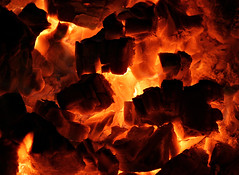 Image by SearchNetMedia via FlickrHaha, catchy title isn't it? Let me explain.
Image by SearchNetMedia via FlickrHaha, catchy title isn't it? Let me explain.Something occurred to me randomly long after writing and scheduling a previous post, a kind of extension, but it was too long to add to that post. It had to do with things like prayers which we find ineffective or offensive or both.
The premise is simple: Why is it that people can outgrow a particular view of religion and still find prayers or other practices that seem to reinforce that older view worthwhile and useable? What about the contradiction?
So I thought it, "Let's pick a facetious prayer, completely fabricated, such as: God, I am a worthless piece of excrement. Let your judgment burn me like hot coals."
If we look at it I know my own first reaction is that I don't agree that human are worthless or that God, whatever that term may signify, would think of us as pieces of shit. In fact, quite the opposite. We are wonderful and amazing and, to use God-talk, we are always amazing and delighting the divine.
That is to say, I would look at that prayer and be dismayed, offended and in disagreement. But I think I can see how it might work and be useful.
First, think of how you feel when you've really hurt someone, when you have really screwed up and disappointed yourself and others. You don't want to think about it because when you do, when you really open yourself to it and acknowledge it, you feel like a worthless piece of shit.
Then if you settle into those feelings, there is shame and embarrassment. You feel hot. In some cases you become hot as your increased blood pressure and vasodialation release large quantities of heat from your body and make you blush. You are burning.
That doesn't last, especially if you acknowledge your error to yourself (and if possible to those harmed or offended), which is in line with confession and contrition. But there can be a time when you feel worthless and burn with shame.
It isn't then that some external super-being called "God" wants you to suffer or to inflict pain as judgment, although some may buy that. It is that God, in this case representing a fundamental awareness of our nature as-it-is and as-it-could-be, including our current situation and how we are connected with everything else, is making us aware of the pain we have caused others and ourselves.
The whole idea of being a wretch and being set alight then can be seen as our conceptual articulation of this experience. It gives voice to it, gives it permission to express itself, and in doing so, to resolve it. To relieve it. To heal it.
Let's say that I had grown up with that prayer, or at the very least spent years reciting it on a daily basis. Let's say there was a similar prayer about joy. Now, maybe 300 out of 365 days of the year I really hadn't done anything so terrible. Maybe I'm a kind, helpful person who avoids temptation and feels ill at the thought of causing pain to others.
But of those 65 days, and maybe on two or three in particular, I am moved by my actions, speech or thought to resonate with the prayer on remorse. So the association in my mind causes neurons in my brain to wire together tying that feeling/experience to that prayer.
Maybe I only really resonate very strongly with that prayer on half a dozen occasions over a couple of decades. But each time, the resonance grows deeper and stronger. In time, when I recite that prayer, "God, I am a worthless piece of excrement. Let your judgment burn me like hot coals," I learn to recognize and explore those parts of me that lead me to do things that create problems in my life (and by extension for others).
Now a prayer like that tends to have another component about mercy, grace or the like, and this corresponds the relief and spaciousness one feels after facing ones mistakes and the consequences with nothing to hide or bottle up. It also corresponds to being able to have compassion for oneself. Hence, through the prayer one can both explore and untangle the areas of oneself that create problems by bringing awareness and compassion to them.
Now, the things is, for it to work, the prayer needs to be charged by synching up with life experiences. When it is charged, we don't have to actually have done something terrible to benefit from it. After all, after we are truly remorseful our ego is put back in proper proportion and we become humble, needing little, generous, etc. Recalling how we have felt at such times can also reinforce these virtues.
We may even learn to spot problem areas we didn't know about because of our familiarity with their "energy", for lack of a better word, and because of the reminder of our fallibility and immersion in humility. And certainly we can start to understand the problems and the pain of others more genuinely, and hence have genuine compassion for them as well.
The same principle would work for the prayer of joy and for others as well. They need to be familiar and charged. Otherwise they will seem bizarre, offensive, silly, petty, obnoxious, or perhaps just pointless. So yes, if the many of the people who regularly pray these prayers and who find them familiar and fully charged were to stop and think about the actual words or their surface level theology, they would see them that way too. But they are working with them on a different level that cannot be readily explained to someone else who doesn't have the same experience.
Cool. Another mystery of prayer and reflection opens up. What is your own experience with this?


This comment has been removed by the author.
ReplyDelete